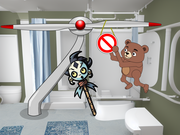he or him / (used for either sex when the sex is unknown or unimportant) / (used before sb's name for emphasis) / (used as a meaningless mock object) / other / another
he; him (used for either sex when the sex is unknown or unimportant) / (used before sb's name for emphasis) / (used as a meaningless mock object) / (literary) other
as (in the capacity of) / to take sth as / to act as / to serve as / to behave as / to become / to be / to do / by (in the passive voice)
because of / for / to
variant of 為|为[wei2] / as (i.e. in the capacity of) / to take sth as / to act as / to serve as / to behave as / to become / to be / to do
youngest / most junior / tiny / one (unambiguous spoken form when spelling out numbers, esp. on telephone or in military) / one or ace on dice or dominoes / variant of 吆[yao1], to shout
prefix used before the surname of a person or a numeral indicating the order of birth of the children in a family or to indicate affection or familiarity / old (of people) / venerable (person) / experienced / of long standing / always / all the time / of the past / very / outdated / (of meat etc) tough
surname Sun
孙
=
孑
+
小
:
Susan Saint Bernard (su) was lucky enough to catch and eat a mosquito (孑) in front of the encampment ((e)n1), but two weeks later, the mosquito's grandson (孙) comes to fight Susan Saint Bernard and avenge the death of his grandfather. Susan Saint Bernard is a little embarrassed and offers a daisy (小) as peace offering.
grandson / descendant
孙
=
孑
+
小
:
Susan Saint Bernard (su) was lucky enough to catch and eat a mosquito (孑) in front of the encampment ((e)n1), but two weeks later, the mosquito's grandson (孙) comes to fight Susan Saint Bernard and avenge the death of his grandfather. Susan Saint Bernard is a little embarrassed and offers a daisy (小) as peace offering.
to go forward / to advance / to go in / to enter / to put in / to submit / to take in / to admit / (math.) base of a number system / classifier for sections in a building or residential compound
to go / to go to (a place) / (of a time etc) last / just passed / to send / to remove / to get rid of / to reduce / to be apart from in space or time / to die (euphemism) / to play (a part) / (when used either before or after a verb) to go in order to do sth / (after a verb of motion indicates movement away from the speaker) / (used after certain verbs to indicate detachment or separation)
去
=
厶
+
土
:
Mnemonic symbol: The "nose" part (厶) can be seen as an arm, which goes through "earth" (土), and this reminds me of some protesters who lock themselves (or their arms, to be specific) to concrete barrels. Cupids dirt capsule could also be a concrete barrel. So in other characters, I'm going to represent 去 by a concrete barrel.
Cupid (qu) is trying to send himself to earth. In the bathroom of the space station (Ø4), he has prepared a capsule made of dirt (土). He's wearing his lucky fake nose (厶) when entering the capsule.
Cupid (qu) is trying to send himself to earth. In the bathroom of the space station (Ø4), he has prepared a capsule made of dirt (土). He's wearing his lucky fake nose (厶) when entering the capsule.

